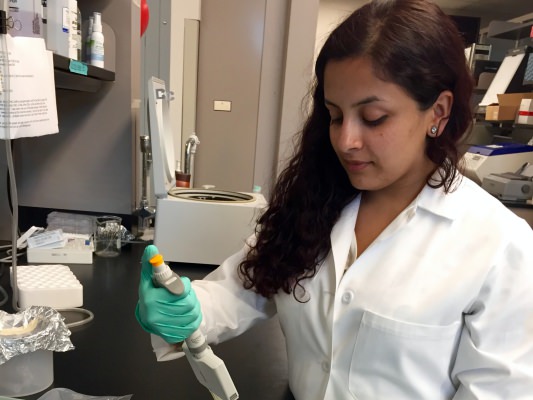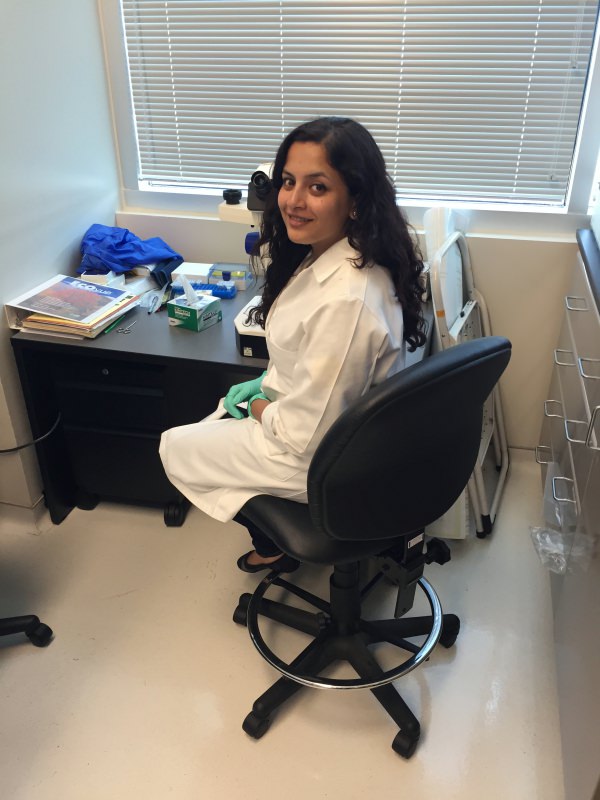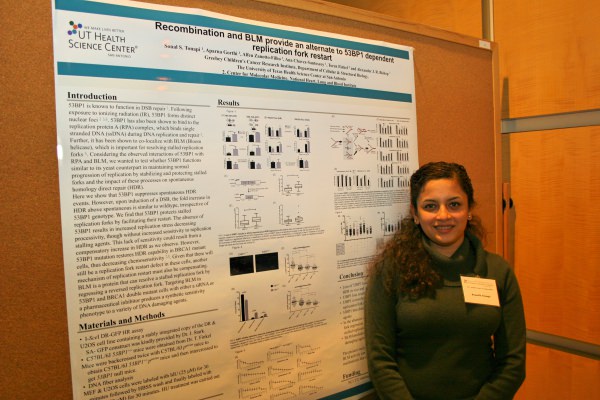Final Words: Sonal Tonapi & the Cancer Biology Track
Congratulations Sonal Tonapi, a student in the Cancer Biology Track, for completing your dissertation on the “Consequences of Endogenous Stress With Deficiencies In The DNA Damage Response Pathway.”
Please tell me about yourself, why did you pick
UT Health Science Center, and your program.

After finishing my undergraduate degree in
Chemistry in India, I moved to the U.S. to start my master’s in Biochemistry and Molecular Biology at Georgetown University.
During this time, I became interested in cancer research and decided to
pursue my Ph.D. I applied to University of Texas Health Science Center San Antonio because of its unique Integrated Multidisciplinary Graduate Program, now called the Integrated Biomedical Sciences program which allowed
me the flexibility to select a lab across any of the departments.
The Cancer Biology track within the department of Cellular and Structural Biology provided
the appropriate platform for my training as a Cancer Biologist. Again the unique
multidisciplinary nature of the program gave us the option to select elective
courses across different tracks. Today, I can confidently say that picking
UTHSCSA and the IMGP program has immensely benefited me by training me in
multidisciplinary fields.
Please provide a few sentences summarizing your dissertation.
What was the experience like for you?

The goal of my dissertation was to
understand the different consequences of endogenous stress in the presence of
defects in DNA damage and response pathways.
I examined two disparate
fundamental questions; (i) The role of 53BP1 in replication progression and its
impact on genomic integrity, especially in the context of BRCA1 deficiency (ii)
Understanding the mechanism of diabetes onset in the absence of ATM.
Working on my dissertation was a great
learning experience for me. It has taught me the value of perseverance as my
very first project in lab failed. At that time, I never thought it possible that
I would graduate with two successful projects.
However with the encouragement of
my advisor, I kept pursuing different ideas and it culminated in two very
interesting projects. Additionally, the
diverse nature of the projects led to me being trained in an array of
techniques and subjects.
Why are you passionate about your research
topic? How did you first become interested in it?
The area of DNA damage repair and the
diseases caused due to defects in this repair remain relatively unknown. This
is partly due to the fact that incidence rates of these diseases are very low.
For examples, there are about 200 patients with Blooms syndrome worldwide.
Ataxia telangiectasia is another such example which occurs in 1 in 40,000
births. However, children born with DNA repair defects have high mortality rates
and most of them die within the first two decades of their life.
Hence, I was
really passionate about understanding the different consequences of DNA repair
defects in order to identify novel targets to improve treatment and reduce the
high mortality seen in these children.
Most of our understanding of DNA damage
response and repair comes from studies done in the context of exogenous acute
damage. These findings although explain cancer predisposition in these
patients, they do not explain why these patients also develop diseases such as neurodegeneration,
immunodeficiency and diabetes.
Why a defect in the ability to repair DNA leads
to diabetes remains unknown. This was the question that initially got me
interested in my dissertation project.
Through my understanding of one of the
disease phenotypes I hoped to get a greater understanding of the different
consequences of DNA repair defects.
What was your best memory during graduate school
or what did you learn?

My best memory during graduate school was
the day I had my dissertation defense.
It was a very satisfying experience to
see the culmination of five years of work and to hear the positive response and
support of my faculty and peers.
What’s next?
I will be starting as a postdoctoral
researcher at Caris Life Sciences in Phoenix, AZ.
Any advice for your fellow graduate students?
Stay positive! There is a light at
the end of the tunnel. Also, don’t be afraid to think out of the box. The risky
ideas can sometimes lead to the most interesting results.
